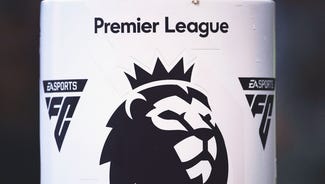
Dominant, energetic, and lethal: Arsenal plays against type in FA Cup final win vs. Chelsea
This was a record thirteenth FA Cup success for Arsenal. It was Arsenal's third FA Cup success in four years. It was the seventh Arsene Wenger has won in his time at Arsenal, more than all but three clubs. Arsenal is capable of winning the FA Cup. It is good at winning the FA Cup. What it is not good at is beating big teams on the big occasion, and it is that failing, which seems psychological as much as anything, that has led to such frustration.
Yet having beaten Manchester City in the semifinal, Arsenal produced another performance of unexpected aggression to down Chelsea, 2–1, in Saturday's FA Cup final. Perhaps Arsenal didn't quite have the control to which Wenger aspires, but there was effort and energy and work rate, a hunger it has often seemed to lack in the past. It led for all but five minutes of the game, twice hit the woodwork and, although it was hanging on a little at the end despite the dismissal of Victor Moses midway through the second half, it could easily have won by three or four.

After all the vitriol directed at Wenger, after missing out on the Champions League for the first time in 18 seasons, after all the doubt about his new contract – which has still not been signed – he ends the season with a memorable win thanks to an early goal from Alexis Sanchez and then, two minutes after Diego Costa equalized, a headed winner from Aaron Ramsey. Arsenal is a master of the optimism-inspiring late-season surge, but this time the hope is perhaps more unexpected, perhaps even realer, than ever.
Arsenal's opener began with N'Golo Kante and Diego Costa, two players who were so critical to Chelsea's title success, running into each other to give away possession. Ramsey played the ball into the box but his pass was cut out. David Luiz and Sanchez went for it as the ball dropped, the ball looping off Chilean and over the defensive line towards Ramsey, who was clearly offside. Ramsey, though, made no attempt to play the ball and, although the linesman's flag went up, the referee Anthony Taylor deemed him not to be interfering as Sanchez poked the ball past Thibaut Courtois. Although Ramsey clearly stepped back, the question must be whether Courtois might have come to claim the loose ball had he not been there.

Chelsea was weirdly lethargic at that stage – so dopey that they forgot to put on the black armbands commemorating the victims of last Monday's Manchester terror attack until half-time – and Arsenal, playing with an uncharacteristic ferocity, spurned two glorious chances to double its advantage. Mesut Özil, slipped through by Sanchez, dinked a shot over Courtois only for Gary Cahill to backheel the ball clear, then Danny Welbeck headed an Özil corner against the post, the ball bouncing back, hitting Ramsey, hitting the post again and bobbling wide.
Arsenal at that stage were playing with such furious industry, such aggression, that Chelsea seemed in danger of being overwhelmed. Courtois made fine saves form Welbeck and Granit Xhaka, and such was the effort that even Özil, having given the ball away with a soft pass, regained possession with a crunching sliding challenge on Hazard.

Mertesacker, having played just 37 minutes of football all season, was outstanding. He may be 32 and his knees creaking to render him even slower than the siege tower he has always resembled, but there is a sense in which in the middle of a three-man defense all a player needs is decent positioning and a willingness to put his body in the way. Again and again he made blocks; again and again his head emerged above a ruck of players to head the ball clear. This was the essence of an old-fashioned defensive performance.
The question, though, was whether Arsenal had run itself out, whether it would have the energy to resist a Chelsea surge in the second half. But Antonio Conte's side, although better than it had been in the first half, never really got going, never exerted the sort of sustained pressure it had in, say, February, when hammering Arsenal 3-1 at Stamford Bridge.
Its desperation came to a head midway through the second half as Moses, having already been booked for hauling down Welbeck on a counter, collapsed near Alex Oxlade-Chamberlain. Taylor, surely correctly, deemed it a dive and showed a second yellow, making Moses the fifth player – the third in the past five years – to be sent off in a Cup final.

Other teams might have quailed at that point but Chelsea has been remarkably resilient all season. On came Willian as the shape changed to a back four and his 76th-minute cross found Diego Costa, who took the ball down on his chest, held off Holding and sent a bouncing volley past David Ospina.
Everything seemed set for a trademark Arsenal collapse but the whole day had been about Wenger's side playing against type. On came Olivier Giroud and his first touch was, having got behind Cahill, to chip a ball across goal for Ramsey, shockingly unmarked, to head in. The scores had been level for only two minutes.
Chelsea came again, but looked shattered. Arsenal threatened on the break. Bellerin slid a shot just wide and Ramsey hit the post again. Each chance gone ramped up the anxiety and amid the nervousness Ospina made a sharp low save to deny Costa and was congratulated as though he had just scored the winner.
But Arsenal held out to win the most enthralling Cup final for years, to add a trophy after a difficult season and, by beating Chelsea, to kindle thoughts that the future might not be so bleak after all.

